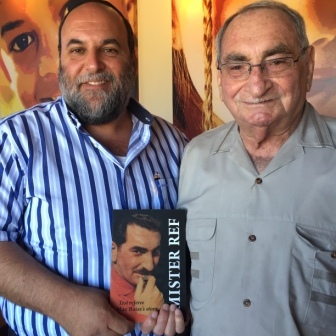
Lifestyle/Community

‘Mr Ref’ a well-timed book to add to SA rugby lore
SUZANNE BELLING
PHOTOGRAPH SUPPLIED
Pictured: Rabbi Moshe Silberhaft receiving a copy of Max Baise’s book “Mister Ref” from the author.
The memoir underscores the validity of Max’s honorary title of “Mr Ref”. In it Baise recounts occasions where he played a central role as referee in international matches and how he approached each game.
In those days there was no television in South Africa or TMOs (or third match officials) – the referee was the sole judge of events as he saw and interpreted them
The book was published in December and will be launched in Cape Town on 25 February and at a date to be announced in Johannesburg.
Rabbi Moshe Silberhaft, country communities rabbi of the SA Jewish Board of Deputies and CEO of the African Jewish Congress, regularly visits Riversdale in the Western Cape where Baise lives. He is full of praise for the ref’s book and has brought copies back to Johannesburg so that a wider readership can learn more of the dramatic life of this charismatic figure.
Baise’s parents, Barney and Rachel, were poor Jewish immigrants from Lithuania who came to this country in the 1920s. They worked in a small general dealer’s store in a remote Free State dorp, moving to Hoopstad in the same province in 1930 to start their own general dealership.
At that stage they already had two sons. Their third son, Motel, was born in June 1932, but he cannot remember anyone calling him anything except Max.
He attended a Jewish boarding school in Johannesburg in 1944, but yearned to go home to Hoopstad where he had friends with whom he shared his passion for rugby, a sport that was not available at the Johannesburg school.
His father agreed to bring him back home and they moved to a farm in the vicinity, from where he cycled eight kilometres every day.
Because of his move back to this remote part of the Free State, Max never celebrated his barmitzvah – no teachers were available.
His parents moved in 1947 to Odendaalsrus, but Max remained behind to complete standards 7 and 8.
His rugby career began in earnest in Hoopstad, where he captained both the under-13 and under-16 teams. In 1950 he completed his matric in Kroonstad, captaining the school’s first rugby team and he represented Free State schools at centre.
His playing career came to an abrupt end through injury not long after he left school.
Two years’ later Max and his cousin Solly went to an Odendaalsrus hotel for a few beers. They found out that there was a meeting of rugby referees and they barged in, paid five shillings and joined the Referees’ Association. They were given rule books and were on their way (they were the only two in that room to become test referees).
By 1960 Max had moved up to the South African trials and had acquired a name for his flamboyant gestures – “some people tend to speak with their hands as well as their tongues”, he wrote.
While his business career went though several ups, downs and changes, he made steady progress towards the top as a rugby referee, taking charge of his first two tests when the French toured South Africa in 1967. His test career continued until the mid-1970s, including two tests in which both he and his cousin Solly participated – Solly as touch judge in the one, with Max refereeing, and reversed roles in the next.
He lost his wife Dorothy in 2010 and has two children.
Max still lives in Riversdale, where owned a bottle store for many years. It was filled with his rugby memorabilia and an attraction for visitors to the town.
Amanda Botha, editor and publisher of the book, describes Max as “a special man with compassionate values of interest and support, which he embodied on the rugby field to the great advantage of the sport”.
He is known as “a man in a million” and “the gentleman of South African rugby”.
Copies of the book are available from Rabbi Silberhaft at moshe@beyachad.co.za; and from Max Baise at dbaise@telkomsa.net at R195 a copy, of which R25 per book will be donated to the Chris Burger Players Fund.





Jonni
January 21, 2016 at 4:08 am
‘Max’s refereeing of the final test match Springboks v The Lions 1974 series, was CONTROVERSIAL to say the least . He is still being accused of bias against The Lions in that match.’
Dick Powell
November 7, 2024 at 8:07 am
As Phil Bennett said years later: He probably thought “I’ve got to live here when this lot has gone home!” In fairness Mr Baise was a very good referee, probably the best in the days of non-neutral officials. And it has provided acres of coverage for the past 50 years. Legendary referee.